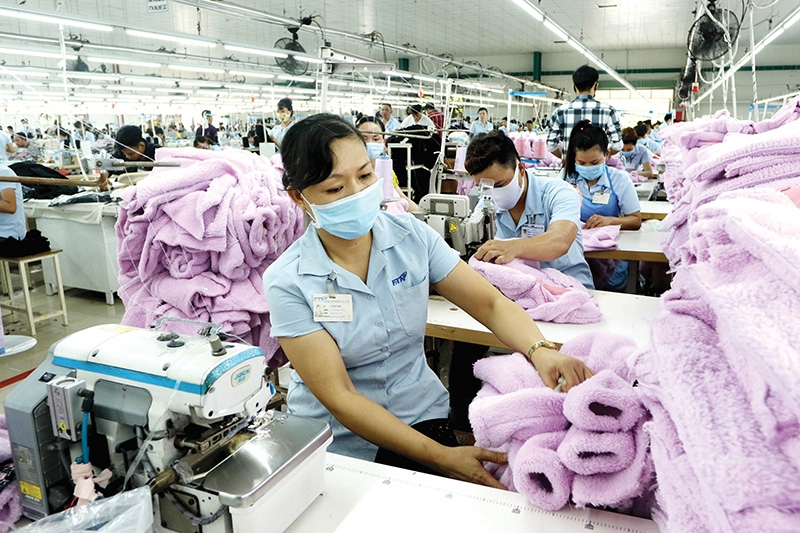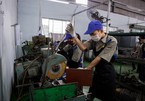 |
| Business bemoans support conditions, Photo: Le Toan |
Over the past few weeks, Vietnam Bank for Social Policies (VBSP), which was established in 2002 to implement preferential credit policies for the poor and other policy beneficiaries, has offered a VND16 trillion ($695.65 million) credit package to enterprises who want to seek preferential loans at zero lending rate in order to pay salaries for their employees.
However, the loans, featuring the government’s efforts to support enterprises during the COVID-19 emergency, may be never reached by borrowers as meeting loaning conditions is not straightforward.
Specifically, in order to reach such loans, an enterprise must have 20 per cent or at least 30 employees with social insurance who are forced to halt employment between April 1 and June 30.
The time of layoff must be at least one continuous month, and the employer has paid in advance at least 50 per cent of salaries. Besides this, the employer must be facing financial difficulties and cannot pay salaries any longer, and must not have had any bad debt at credit institutions and foreign banks by December 31, 2019.
If the borrower can meet all of these conditions, they must submit a loan proposal to the district-level people’s committee where the enterprise and the bank’s branch are located. Within three working days, the committee must appraise the proposal and then submit it to the chairperson of the provincial-level people’s committee. Within two working days, the chairperson must issue a decision on adopting the proposal, and send it to the VBSP’s branch which will process final procedures to provide the loan for the enterprise.
“The procedures and conditions are quite complicated and challenging, and we think we will never be able to approach such a kind of loan,” said Nguyen Thi Tuat, director of fruit and vegetable processor Hoang Ngoc Trading JSC, based in Hanoi’s Quang Minh Industrial Park. “We have had to resort to loans from other sources, though having had to halt operations of two facilities at the park.”
Tuat said while companies like hers are in dire need of capital, they are almost unable to meet such tough loan conditions.
The company has invested VND80 billion ($3.47 million) to build a processing system rice including three facilities. Currently only one facility is operating due to difficulties in the outlet for the products. The company originally had a workforce of 200 people, and only a third of them are currently at work.
At last week’s discussion of the National Assembly (NA) on the country socio-economic situation, such a plight as Hoang Ngoc was highlighted, with many NA members noting that during their meetings with the business community in their localities, one of the common difficulties voiced by enterprises is that they want the state’s pro-business policies to soon be put into practice, which can help them out of current woes.
Over the past few months, the government has been deploying some drastic measures to support enterprises. Specifically, the State Bank of Vietnam has been deploying a package worth over VND300 trillion ($13 billion) for enterprises and households, in the form of debt payment deferral and preferential loans.
Meanwhle, the Ministry of Finance has been implementing a VND180 trillion ($7.82 billion) credit package to support enterprises. The government has also been carrying out a VND62 trillion ($2.7 billion) package, to support poor and unemployed people, and using about VND3.4 trillion ($147.8 million) to deploy measures against COVID-19 in 2020.
However, Minister of Planning and Investment Nguyen Chi Dung pointed out that almost all enterprises are now bogged down in difficulties.
“Figures from a recent survey show that enterprises including big ones and small- and medium-sized ones are facing massive difficulties, especially in cash flows,” he said. “Though the government and the prime minister, ministries, and agencies have enacted and implemented various solutions to support enterprises, many have been unable to approach such assistance. A number of policies have yet to be materialised and enterprises cannot approach them.”
Echoing this, NA deputy Thach Phuoc Binh from the Mekong Delta province of Tra Vinh cited a survey by the General Statistics Office stating that the pandemic has had negative impacts on 85.7 per cent of enterprises and nearly 20 per cent have had to halt operations.
There will be over 160,000 enterprises halting operations at some point if COVID-19 lasts into the third quarter of the year, and the figure will be around 205,000 if the pandemic drags into the fourth quarter.
“Meanwhile, many of the state pro-business policies have yet to become true. During my meetings with enterprises, they said they are unable to approach such policies and now are in misery,” Binh said. “Thus, I propose that the state continues applying practical solutions, especially in reducing lending rates and deferring payment of loans, taxes, and fees.”
Meanwhile, NA deputy Nguyen Ngoc Phuong representing the central province of Quang Binh underlined the need for the state to not only materialise its pro-business policies to recover from damage caused by COVID-19, but also boost regulatory reform to create a more business-friendly climate.
“Since early this year, tens of thousands of enterprises have faced bankruptcy and losses, leading to big debts and unemployment, affecting the national state budget,” Phuong said.
“Though the government has promulgated many policies, many enterprises that are producing goods and exploiting natural minerals cannot export these, though they have many a time asked authorised agencies to grant them export licences. As a result, they are now bogged down in big debts and cannot pay bank loans.”
In another case, many investors have poured millions of US dollars into energy projects, but they cannot come into operation due to many issues including a lack of guiding documents of the Law on Planning, Phuong added. “In order to help them out of difficulties NA members have made proposals to the government, but the difficulties have yet to be resolved so far, while the nation is suffering from power shortages.”
NA deputy Nguyen Sy Cuong, representing the south-central province of Ninh Thuan, proposed that the government should pay special attention to how its policies to assist enterprises are being implemented.
“For example, the VND62 trillion ($2.7 billion) package to support poor and unemployed people are facing difficulties in disbursement, while the VND16 trillion ($695.65 million) from VBSP have yet to be disbursed. The bank reported that it has yet to receive any loan proposal from any enterprise,” Cuong said.
Commenting on the government’s pro-business policies, Nguyen Minh Cuong, principal country economist from the Asian Development Bank, told VIR that the policies are important for both economic relief and recovery.
“More fiscal measures should be provided to support affected firms and individuals. The central bank has cut rates further to strengthen the liquidity in the economy, and commercial banks have arranged a substantial amount of credits to assist businesses. Now it is time to increase fiscal support,” Cuong said.
“For example, the existing VND180 trillion ($7.82 billion) package on tax deferrals may need to be extended as five months would not be sufficient for affected firms to recover.
As the banks are not able to relax lending standards to accommodate affected firms which may have deteriorating cash flows and balance sheets, the creation of a credit guarantee system from the state budget at the national level may be useful to assist the banks to lend more to these firms, especially small- and medium-sized enterprises,” he continued. VIR
|
Supporting private sector activities with focus on those most affected by COVID-19 To avoid persistent negative effects on the economy, it is critical to have viable and dynamic firms. Governments have a variety of tools to choose from to support firms, including financial solutions, grants and fee reductions, and cash transfers. As mobility restrictions are eased, policies should be refocused towards supporting growth-oriented enterprises, promoting reallocation of resources to more efficient companies, restructuring firms and avoiding measures that risk propping up zombie firms. In the early stages of recovery, both larger corporations and small- and medium-sized enterprises (SMEs) may be facing the risk of insolvency. Moreover, the negative effects on credit markets, supply chains, and worker productivity will dissipate only gradually. There may be a change in consumer behaviour, and some firms, especially SMEs, will need support to adjust business models to a different economic environment. The deterioration of firm’s balance sheets will affect financial sector decisions, and will increase risk aversion parameters when extending new credit. There are clear synergies between the recommended measures discussed above and the promotion of private sector activities during the recovery phase. For example, the acceleration of the investment programme can benefit local firms through direct contracting and job creation. The implementation of the digital agenda aims to reduce transaction costs of private firms, especially the smallest ones, in their relationship with the government. The development of mobile money would help household businesses and farmers that do not own a bank account, while the protection and creation of jobs will also help businesses through a reduction of their labour costs. Boosting human capital ensures a steady supply of productive workers to the private sector. Bringing people back to work will require dynamic firms, especially in labour-intensive sectors. It is worth underscoring that all sectors have not been equally affected by COVID-19. Some appear to have been relatively immune, like the agriculture sector. Unfortunately, others have been harder hit, including the tourism and the transport sectors. For this reason, in addition to the cross-cutting measures discussed above, it would be useful to target these two sectors with a set of specific interventions. Source: World Bank |
Nguyen Thanh

VN supporting firms need better policies to help them recover
The policies on supporting businesses have been designed well, but the support is not enough to help businesses recover losses, economists say.

VN Gov’t steps up measures to support Coronavirus-affected businesses
The Government has introduced a range of new measures to support businesses affected by the COVID-19 pandemic, according to its Resolution No. 84.